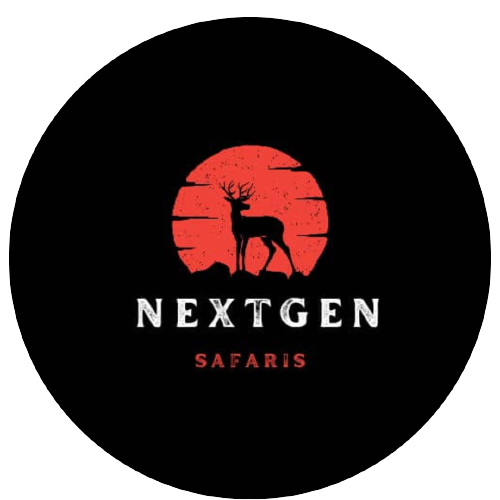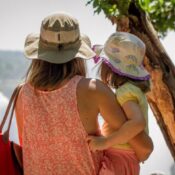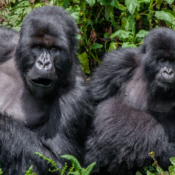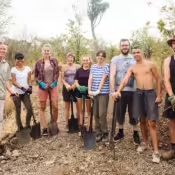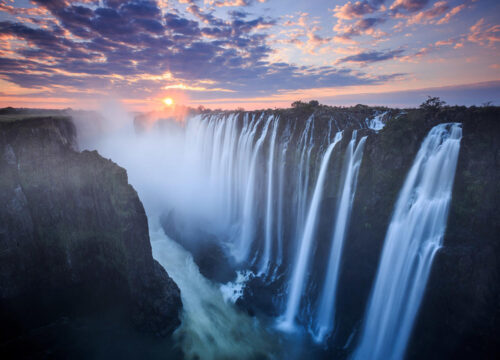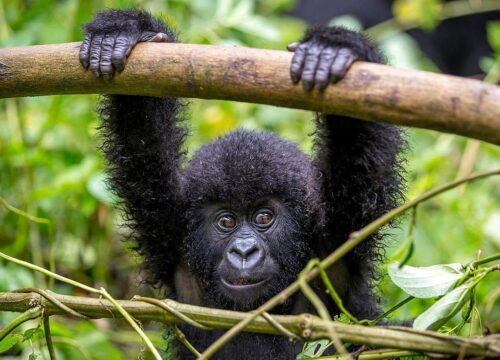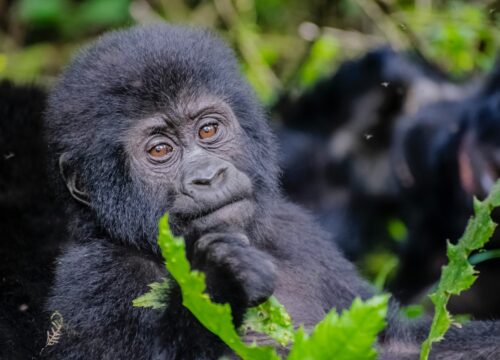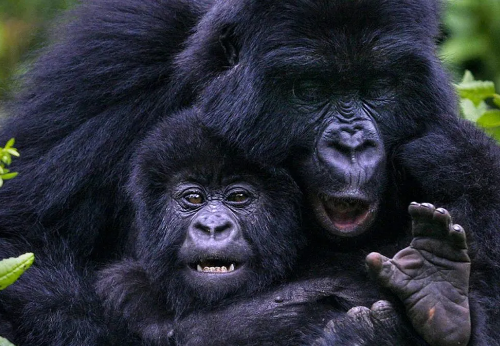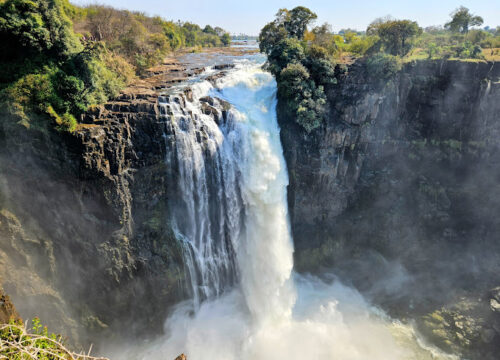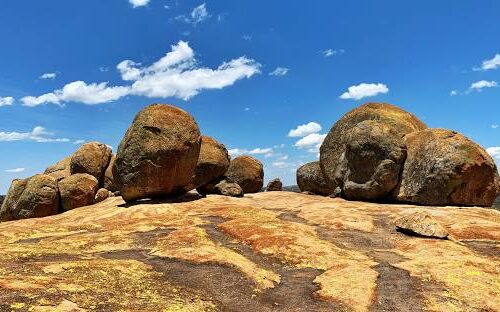Madikwe Game Reserve
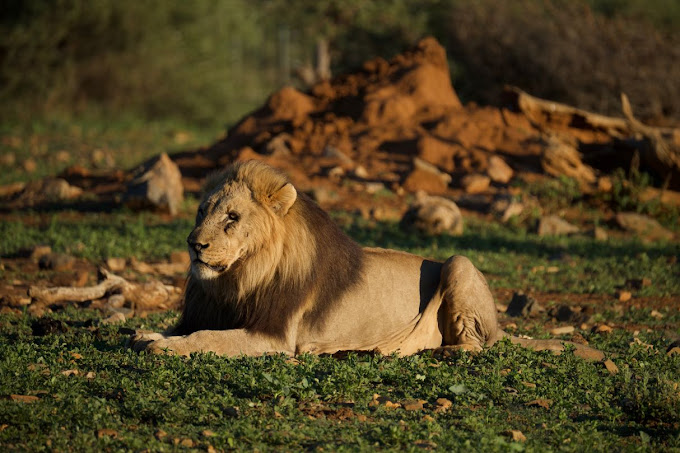
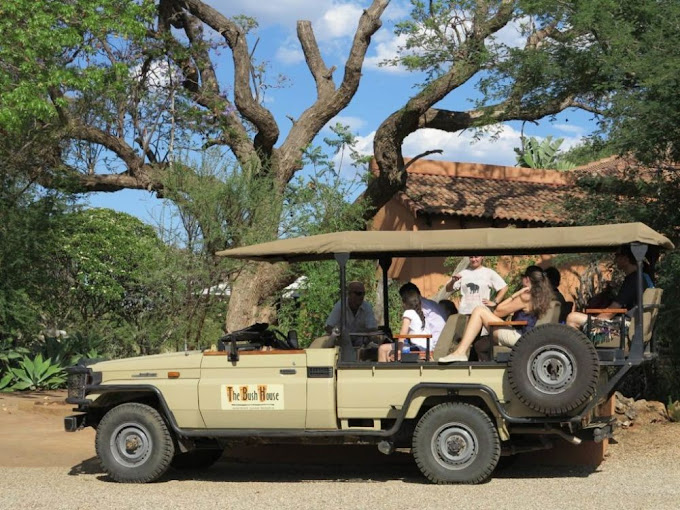
Madikwe Game Reserve overview
Although state-owned, Madikwe Game Reserve operates as a private game reserve. No self-drive visitors are allowed, and all drives are conducted by the private lodges dotted around the reserve. This makes for a very exclusive experience; even more so if staying in one of the lodges that has a private concession within the Madikwe Game Reserve.
Madikwe Game Reserve Pros & Cons
- Excellent wildlife viewing with all of the Big Five present
- Similar, exclusive experience, but more affordable compared to Sabi Sands
- Open-vehicle game drives and off-road driving permitted
- Night drives and walking safaris available
- Malaria-free
- Many upmarket safari lodges to choose from
- Self-catering accommodation available
- Less busy than Sabi Sands
- No self-drive permitted, only expensive, all-inclusive packages available
- Leopard sightings not as abundant as in Sabi Sands
- Fully fenced park that isn’t part of a larger ecosystem
Madikwe Game Reserve Wildlife
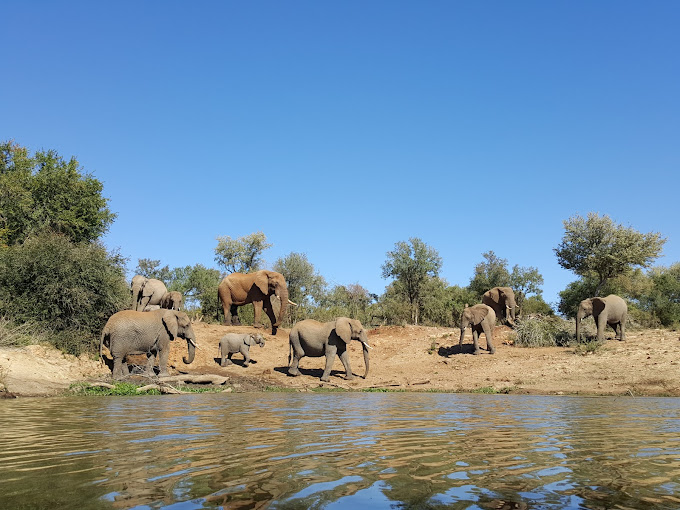
Madikwe Game Reserve is a prime Big Five destination, and you can expect to see most major safari animals in a two-day visit. Lion is easily seen but leopard and cheetah sightings are hit-and-miss. There is a resident pack of wild dog and sightings tend to be superb. Lucky visitors might also spot the rare brown hyena.
Madikwe Game Reserve Scenery
Madikwe Game Reserve lies in a transition zone between the Kalahari thornveld and bushveld. The area is dotted with big rocky outcrops and is bordered in the south by the Dwarsberg Mountains. Madikwe dam is a focal point in the reserve and a great place to see animals coming to drink at sunset.
Madikwe Game Reserve Weather & Climate
Summertime at Madikwe Game Reserve is a hot and wet affair, as it’s also the area’s Wet season (October to April). The rainfall and heat both increase over the first few months, peaking in January with afternoon downpours and an average daytime temperature of 34°C/93°F. Things start to get cooler and less damp in March, kicking off the transition into a dry and generally sunny winter (May to September).
Best Time To Visit Madikwe Game Reserve
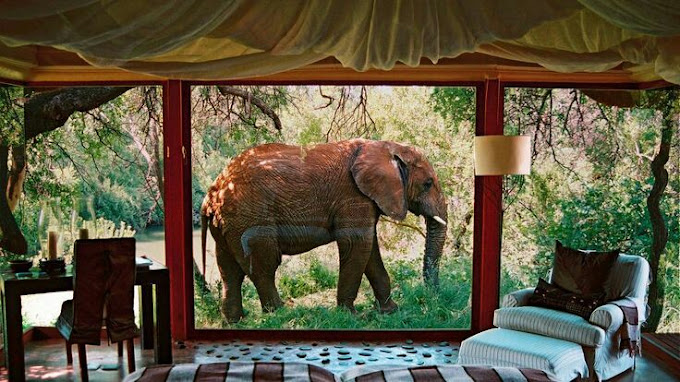
The Dry season (May to September) is the best time to visit Madikwe Game Reserve, particularly the pleasantly mild months at the start and end of this period. In the middle of this season, there can be a biting chill in the air, which means you should wrap yourself up in your warmest clothes for early-morning or late-afternoon game drives. The drier months also coincide with Madikwe’s low season.
Wildlife & Animals – Madikwe Game Reserve
Madikwe Game Reserve is an excellent Big Five reserve. Lion are plentiful, but sightings of cheetah and leopard are more hit-and-miss. This is compensated, however, by good sightings of wild dog. In general, wildlife viewing might be slightly less easy than in the Greater Kruger private reserves, including Sabi Sands, but there are fewer vehicles around resulting in high-quality wildlife experiences.
Madikwe Game Reserve Wildlife Highlights
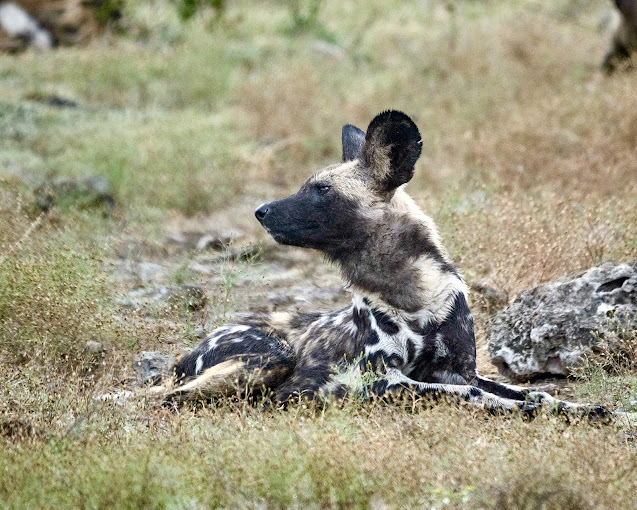
The dry country habitat is home to the spotted hyena as well as the rare and interesting brown hyena, not often seen in other parts of the country. Other dry country species you might encounter here include the gemsbok and eland. Aardvark, serval and caracal tend to be elusive, but are sometimes spotted on night drives.
Best Time for Wildlife Viewing in Madikwe Game Reserve
For wildlife viewing, the dry months of June to September are best. Although the evenings can be cold, animals gather around permanent water sources and vegetation thins, making wildlife easier to spot.
Birds-Madikwe Game Reserve
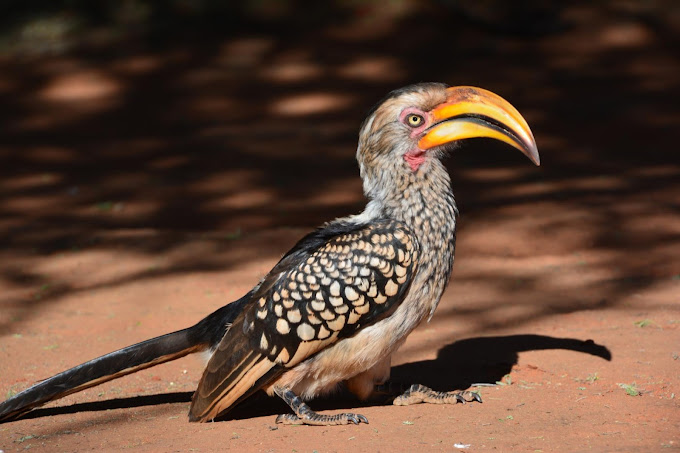
With over 300 species recorded, Madikwe Game Reserve is a great birding destination. Walking safaris and night drives tend to add to the birding opportunities. Some of the more conspicuous specials to look out for include the yellow-throated sandgrouse, which occur in large flocks on the plains, as well as southern pied babbler, which are easily spotted due to their characteristic babbling sounds. Migratory birds are present from November to April.
Birding Specials–Treats for Avid Birders
- African finfoot
- Barred wren-warbler
- Black-backed puffback
- Black-throated canary
- Blue-cheeked bee-eater
- Bronze-winged courser
- Burchell’s courser
- Cardinal woodpecker
- Gabar goshawk
- Green-winged pytilia
- Kori bustard
- Marico flycatcher
- Red-billed buffalo-weaver
- Short-toed rock thrush
- Southern pied babbler
- Temminck’s courser
- Violet-eared waxbill
- White stork
- White-throated robin-chat
- Yellow-throated sandgrouse
Best Time for Bird Watching
Although November to April tends to be the best time (due to the presence of migratory species), birding is always good in Madikwe. For wildlife viewing June to September is best.
Madikwe Game Reserve Weather & Climate
In South Africa, summer and winter occur at opposite times to those seasons in Europe and North America. Madikwe Game Reserve experiences summer rainfall. Therefore, summer in Madikwe corresponds with the Wet season (October to April), and winter with the Dry season (May to September). High temperatures and thunderstorms are usual in the summertime. Winters are temperate and sunny, but cool at night.
Dry Season–May to September – Winter
Winters have little to no rainfall and the humidity is low. Water becomes hard to find, so animals are forced to gather at reliable water sources. This, combined with thinning vegetation, makes wildlife easier to spot.
- May – Temperatures of 7°C/45°F in the morning and 25°C/77°F in the afternoon mark the end of summer.
- June, July & August – Warm clothing is needed for early morning game drives as the average minimum temperature is 6°C/43°F. Daytime is nice and clear, with temperatures around 22°C/72°F.
- September – A beautiful time of year with average afternoon temperatures of 28°C/82°F and warmer mornings of about 13°C/55°F.
Wet Season–October to April – Summer
It can be quite hot in summer, but the humidity isn’t as uncomfortable as it is at the coast. Daytime temperatures average 32°C/90°F, and occasional rain breaks the heat. It seldom rains all day, but the pattern is afternoon storms.
- October & November – Afternoon rains become more common as summer progresses, clearing the hazy skies. Temperatures are between 17°C/63°F in the morning and 33°C/91°F in the afternoon.
- December, January & February – December and January are the wettest months, characterized by torrential downpours in the afternoon. Daytime temperatures are usually around 33°C/91°F.
- March & April – A cooling trend develops, and the rains gradually disappear. The month of April is sunny, with daytime temperatures averaging a lovely 29°C/84°F. Nights are mild at around 13°C/55°F.
Getting There – Madikwe Game Reserve
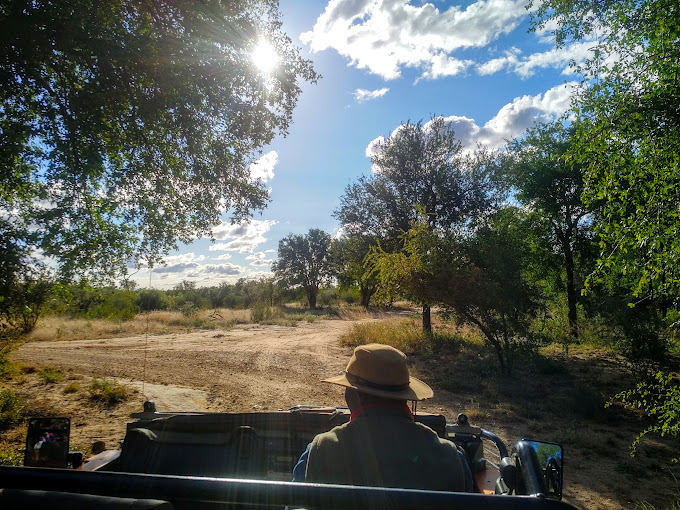
Most visitors to South Africa fly into O.R. Tambo International Airport (JNB) in Johannesburg. The easiest way to get to Madikwe Game Reserve is to fly from Johannesburg. The flight takes about 1 hour.
It is also possible to rent a car and drive to the reserve, which is situated adjacent to the Botswana border about 360km/223mi from Johannesburg. The trip takes about 4½ hours*
Airlines & Ticket Prices
Please check Skyscanner to see which airlines can take you to O.R. Tambo International Airport (JNB), and what tickets would cost.
Domestic Flights
In most cases, your tour operator will book domestic flights as part of your tour package. Federal Airlines offers a shuttle service to Madikwe Game Reserve.
Malaria & Safety – Madikwe Game Reserve
Madikwe Game Reserve is, in our opinion, a safe place for visitors. South African parks and reserves maintain a very high standard regarding safety and crime inside these areas is very unlikely. There is always some crime in cities, but as long as you take normal safety precautions when visiting urban places on your tour, there is nothing to worry about (see ‘Cities & Other Urban Areas: Safety Precautions’ below). The vast majority of travelers in South Africa don’t have any incidents during their visit.
Malaria-Free & Vaccinations
Travel to South Africa might require several vaccinations, which you should get before embarking on your journey (consult your local travel clinic). There is no malaria in Madikwe, so antimalarials aren’t a requirement when visiting here. Malaria is only a concern if you visit Kruger National Park and surrounds.
Wildlife Viewing
The ‘Wildlife Viewing Safety Precautions’ below contain tips for viewing wild animals in the bush. In general, your guide will ensure your safety throughout your stay. Guides are experts and know how to view wildlife in the safest manner possible.
INQUIRE NOW
GENERAL INFORMATION ON A SOUTH AFRICA SAFARI
ENTRY REQUIREMENTS:
All visitors to South Africa must have a valid passport with at least 4 consecutive blanks pages. Any applicable visa and/or relevant documentation are the responsibility of the traveller. For further information on Visa requirements visitors are advised to contact their nearest South African Embassy or Consulate.
LANGUAGE:English
TIME: GMT +3
VOLTAGE: 220 Volts/AC50Hz. Sockets are UK style, 3 pin square plugs. Power is from the government in the city/major towns and generator with inverter back up in the Safari Lodges and Camps.
CURRENCY: Foreign currency must be changed at the Bank, Bureau de Change, and Hotel/Safari lodge/Camp/Resort. Major Credit Cards, Master card, Visa, American Express, are usually accepted throughout the country. Where credit cards are accepted, the payment will normally be recorded in US$ regardless of the card’s default currency.
CLOTHING: Dress is mainly informal and should be comfortable as well as practical. Something warm should be brought along for early morning and evenings. Safari clothes are available from hotels/lodges/camps.
BAGGAGE: Where possible, travel light. Baggage space on safari is limited to medium suitcase or soft bag per person plus reasonable amount of hand luggage. There is 15 Kilogram per person limit on all flights to the wildlife sanctuaries. Excess luggage must be stored in your arrival hotel.
WATER: You will find many different of opinion of what is safe and what is not. We recommend for peace of mind, to drink local Bottled Mineral water. It is important to drink plenty of water especially during the hotter months. We would recommend that guests drink at least 2 to 3 liters of water per day to limit the effects of dehydration.
HEALTH; East Africa is a safe and secure destination; however, it is a good idea to take a few precautions. Kindly consult your GP or local doctor at least 6 weeks before you travel, with regards: Malaria prophylactics. East Africa is a known malaria area and preventive measures are essential. You are advised to take one of the recommended anti-malarial drugs. Be sure to wear long sleeved shorts and trousers after sunset and spray the exposed parts of your body with a mosquito repellent spray Remember to protect yourself from direct sun rays with sunscreen cream or safari hat.
DIETARY REQUIREMENTS: For those guests with specific dietary requirement, please ensure we are notified prior to travel
GRATUITIES: As a guideline and dependent on how happy you are, we would suggest the following: The General Hotel/Lodge/Camp Staff – Approximately U$ 10.00 per person per day Driver Guides – Approximately US$ 15.00 to US$ 20.00 per person per day.
PHOTOGRAPHY: Please be careful when photographing public buildings, airports, bridges, the national flag and people in uniform. Ensure that you have sought permission before photographing local people and their villages. If in doubt, please check with your guide.
-
Book a Customized Safari
Read about
10 Things you Should NOT DO on an African Safari.
What to expect on a safari in Uganda.
Bwindi Impenetrable National Park
How to Choose the Best Tour Operate for Your Safari in Africa
12-Day Gorilla Tracking in Bwindi
Some of our Gorilla and wildlife Safaris
1 Day Jinja Ultimate tour Experience
1 Day White Water Rafting in Jinja
3 Days Bwindi Gorilla Habituation via Rwanda
3 Day Birding Safaris and Photography in Uganda
3 Day Safari to Queen Elizabeth National Park
3 Day fly in Gorilla Trekking Safari from Masai Mara
3 Day Grand Gorilla Trekking Safari
4 Day Chimpanzee and Gorilla Trekking Safari
Recent Posts
One-Way Trip from the UK to Victoria Falls
One-Way Trip from the UK to Uganda
Tours for Groups and Families at Victoria Falls
Conservation Programs for Local Wildlife at Victoria Falls
Quick booking process
+256781282344
+256755922154
